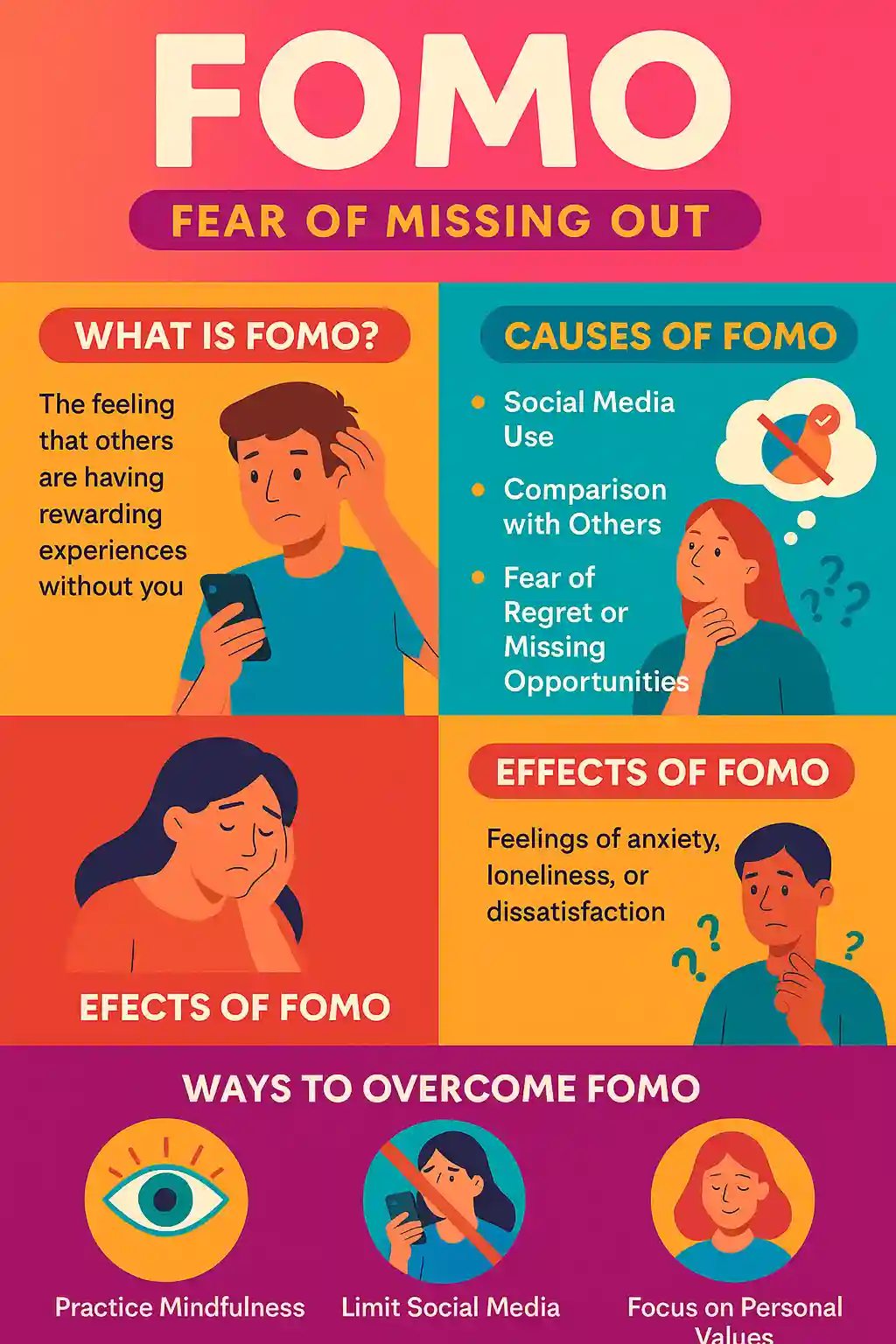
In an age where a single scroll reveals hundreds of curated moments from other people’s lives, it’s easy to feel as though you’re falling behind. That unsettling twinge—that others are living better, fuller, more exciting lives—is what psychologists call the fear of missing out. Known commonly as FOMO, it’s far more than a buzzword. For many, it’s a daily emotional burden shaped by the pressure to keep up with a fast-moving, hyper-connected world.
Whether you’ve felt uneasy after seeing a party you weren’t invited to, or experienced anxiety from not checking your phone, you’re not alone. The fear of missing out is real, measurable, and increasingly recognized as a byproduct of our digital age.
Where FOMO Comes From: A Natural Human Instinct
At its core, the fear of missing out isn’t irrational—it’s evolutionary. Humans have always been wired to stay connected to their tribe. Belonging was once a matter of survival. If our ancestors missed a crucial event, they risked being excluded or losing access to shared resources. Today, the stakes are more social than survival-based, but the mechanism hasn’t changed.
We still fear being left out, and social media amplifies that fear at a massive scale. With constant access to updates, parties, successes, vacations, and career milestones, it can feel like the entire world is moving on without you.
This emotional pull is magnified by how platforms are designed. As noted by experts at The Cleveland Clinic, social networks are structured to reward comparison and trigger compulsive behaviors—often leading to feelings of inadequacy, loneliness, and anxiety.
How FOMO Affects Daily Life
The fear of missing out can quietly erode the quality of your life without you even realizing it. Here are some of the most common ways it creeps in:
1. Constant Phone Checking
That quick glance at your phone becomes an endless loop of refreshes. The desire to stay updated overrides your ability to be present. Even joyful moments can feel dulled by the nagging worry that there’s something better happening elsewhere.
2. Difficulty Saying No
People driven by FOMO often find themselves overcommitting. They say yes to events, opportunities, and outings they don’t really want—just to avoid the discomfort of missing out.
3. Dissatisfaction with the Present
Even while attending a gathering or enjoying a hobby, your mind wanders: What else is happening? Is someone having more fun than me? FOMO pulls attention away from the now and focuses it on imagined possibilities.
4. Sleep and Mental Health Strain
Late-night scrolling to “catch up” can disrupt sleep cycles and deepen feelings of loneliness. According to Verywell Mind, FOMO is linked to increased rates of anxiety and depression, particularly among young adults.
Who Feels FOMO the Most?
While anyone can experience it, research shows certain groups are more vulnerable:
-
Teens and young adults are especially affected, as their social lives often revolve around online visibility and peer comparison.
-
People with low self-esteem tend to interpret others’ highlights as personal shortcomings.
-
Professionals in competitive industries often experience FOMO tied to career progress—missed promotions, trending conferences, or public accolades.
Surprisingly, high-achievers aren’t immune. In fact, their drive for excellence can magnify FOMO, as they’re more likely to compare their accomplishments with others’.
The Role of Social Media
While FOMO predates the internet, there’s no denying that digital culture intensifies it. Scrolling through a feed packed with beach trips, weddings, and shiny success stories can distort your perception of normalcy. You might see 20 amazing things people are doing—but forget those posts came from 200 acquaintances.
Social media doesn’t show reality—it shows the highlight reel. That disconnect can make your own life feel dull by comparison, even when it isn’t. As pointed out by Psychology Today, the emotional cost of this comparison can lead to symptoms of burnout, shame, and detachment.
Can FOMO Be a Good Thing?
Interestingly, not all fear of missing out is harmful. In small doses, it can be motivating. The fear of being left out of professional growth, for example, might push you to attend a networking event or take a new course. FOMO can even drive creativity or exploration—so long as it doesn’t spiral into obsession.
The key is knowing when FOMO becomes toxic. If you’re making decisions out of anxiety, not desire, it’s time to reassess.
How to Manage the Fear of Missing Out
Here are actionable, research-supported steps to keep FOMO in check:
1. Reframe Your Thoughts
Instead of focusing on what you might miss, focus on what you’re gaining in the present. Replacing “I wish I were there” with “I’m glad I chose rest tonight” can shift your mindset.
2. Schedule Digital Detoxes
Take structured breaks from social apps. A weekend offline can reset your relationship with your phone. Apps like Freedom or Moment can help you track and limit screen time.
3. Set Intentions Before Scrolling
Ask yourself: Why am I opening this app? If it’s out of habit or boredom, opt for something more grounding—like journaling, walking, or calling a friend.
4. Cultivate Gratitude
Gratitude training has been shown to reduce FOMO. Try ending your day by writing down three things you genuinely appreciated, no matter how small.
5. Embrace JOMO
The “Joy of Missing Out” is real. Learn to value the peace that comes from being present where you are. Doing nothing isn’t laziness—it’s luxury.
Why FOMO Deserves Serious Attention
It’s easy to dismiss the fear of missing out as a modern quirk. But behind it lies a web of emotional habits that affect relationships, self-worth, and decision-making. Left unchecked, FOMO leads to a life of chasing moments instead of living them.
As our digital lives become more entwined with our identities, understanding FOMO is essential. It’s not about avoiding social media or never feeling envy—it’s about learning how to live fully, without needing validation from every click and like.
Frequently Asked Questions
Q1: What exactly is FOMO?
FOMO, or the fear of missing out, is the emotional discomfort people feel when they believe others are experiencing something enjoyable without them.
Q2: Is FOMO a mental illness?
No, it’s not a clinical diagnosis. However, it can worsen anxiety, stress, and depression, especially when tied to excessive social media use.
Q3: Who is most affected by FOMO?
Teens, young adults, and high-achievers are most vulnerable, though anyone who feels isolated or overly connected online can experience it.
Q4: Can FOMO be healthy?
In small doses, it can be motivating. But when it dictates choices or leads to burnout, it becomes harmful.
Q5: How do I stop feeling FOMO?
Limit screen time, reframe negative thoughts, cultivate gratitude, and explore JOMO (Joy of Missing Out) practices.





